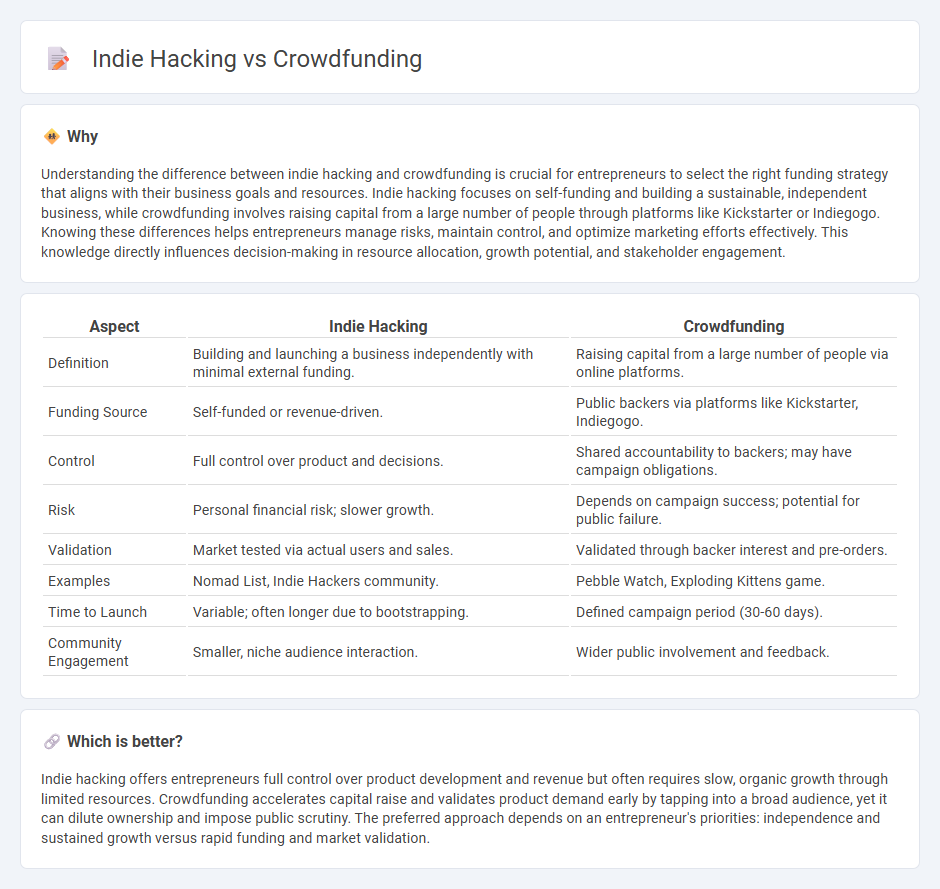
Indie hacking involves entrepreneurs independently building and launching products using personal resources, allowing full creative control and rapid iteration. Crowdfunding enables startups to raise capital from a broad audience through platforms like Kickstarter or Indiegogo, validating ideas while securing early customers. Explore the unique opportunities and challenges of indie hacking and crowdfunding to determine the best path for your entrepreneurial journey.
Why it is important
Understanding the difference between indie hacking and crowdfunding is crucial for entrepreneurs to select the right funding strategy that aligns with their business goals and resources. Indie hacking focuses on self-funding and building a sustainable, independent business, while crowdfunding involves raising capital from a large number of people through platforms like Kickstarter or Indiegogo. Knowing these differences helps entrepreneurs manage risks, maintain control, and optimize marketing efforts effectively. This knowledge directly influences decision-making in resource allocation, growth potential, and stakeholder engagement.
Comparison Table
| Aspect | Indie Hacking | Crowdfunding |
|---|---|---|
| Definition | Building and launching a business independently with minimal external funding. | Raising capital from a large number of people via online platforms. |
| Funding Source | Self-funded or revenue-driven. | Public backers via platforms like Kickstarter, Indiegogo. |
| Control | Full control over product and decisions. | Shared accountability to backers; may have campaign obligations. |
| Risk | Personal financial risk; slower growth. | Depends on campaign success; potential for public failure. |
| Validation | Market tested via actual users and sales. | Validated through backer interest and pre-orders. |
| Examples | Nomad List, Indie Hackers community. | Pebble Watch, Exploding Kittens game. |
| Time to Launch | Variable; often longer due to bootstrapping. | Defined campaign period (30-60 days). |
| Community Engagement | Smaller, niche audience interaction. | Wider public involvement and feedback. |
Which is better?
Indie hacking offers entrepreneurs full control over product development and revenue but often requires slow, organic growth through limited resources. Crowdfunding accelerates capital raise and validates product demand early by tapping into a broad audience, yet it can dilute ownership and impose public scrutiny. The preferred approach depends on an entrepreneur's priorities: independence and sustained growth versus rapid funding and market validation.
Connection
Indie hacking fuels entrepreneurship by enabling individuals to build and grow startups independently, often relying on creative funding sources like crowdfunding platforms. Crowdfunding validates market demand and provides essential capital without traditional investment, empowering indie hackers to maintain control and iterate rapidly. This synergy accelerates product development and fosters a community-driven approach to business growth.
Key Terms
Capital Raising
Crowdfunding platforms like Kickstarter provide indie hackers with an accessible way to raise initial capital by appealing directly to future users, allowing them to validate demand while securing funds without equity dilution. Indie hacking typically relies on bootstrapping or angel investments, emphasizing long-term control and sustainability over rapid capital influx. Explore deeper strategies to optimize your capital raising approach for sustained growth in entrepreneurial ventures.
Bootstrapping
Bootstrapping emphasizes self-funding and organic growth, allowing indie hackers to maintain full control without relying on external investors as in crowdfunding. Indie hacking leverages minimal resources to validate ideas quickly, while crowdfunding depends on pre-selling or securing funds from a broad audience to scale. Discover how bootstrapping strategies empower indie hackers to build sustainable businesses independently.
Community Engagement
Crowdfunding leverages a broad community to raise capital and validate ideas quickly, fostering diverse supporter networks and instant feedback loops. Indie hacking emphasizes deep community engagement through continuous, direct interaction with niche audiences, building long-term relationships and iterative product improvements. Discover how each approach can strategically enhance your project's growth by exploring their community engagement dynamics further.
Source and External Links
Crowdfunding - Wikipedia - Crowdfunding is the practice of funding a project or venture by raising money from a large number of people via the internet, involving project initiators, supporters, and platforms to connect them, and raised over $34 billion worldwide in 2015.
What is crowdfunding? Here are four types for startups to know - Stripe - Crowdfunding is a way for startups to raise money through collective efforts online, relying on contributions from friends, family, customers, and investors, as an alternative to traditional funding.
Crowdfunding - Small Business Financing: A Resource Guide - Crowdfunding uses online platforms to collect small amounts from many people, commonly in donation, reward, or equity-based models, and has been enabled for equity crowdfunding through regulatory acts like the JOBS Act.
 dowidth.com
dowidth.com